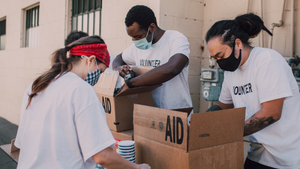Nevada police department, medical school, partner to train officers in emergency first aid
Amid the disturbing rise of mass shootings over the last few decades (most recently, the tragedy in Highland Park, Ill. over the holiday weekend), police and law enforcement organizations across the United States—regardless of size—are at the front line of defense. Standard operating procedures and training norms have likewise evolved to meet the modern day challenge.
July 5, 2022

One such program, in Las Vegas, Nv. has seen more than 1,200 officers with Las Vegas Metropolitan Police Department instructed in lifesaving medical training by one a medical university, increasing their ability to save lives before emergency medical personnel are allowed onto a scene.
“This program means a lot to our officers, especially given the recent tragedies our country and our world have endured, including the October 1, 2017 incident in Las Vegas—an event that served in large part as the genesis for our new world-class training center,” said Capt. Reggie Rader of Metro’s organizational development bureau. “Our officers are expanding their skills and knowledge in stopping bleeds from critical wounds, triage care, emergency care, and hospital transfers, to name a few. These skills can be the difference-maker in reducing deaths and improving outcomes both during daily medical emergencies where officers are first to the scene as well as situations involving violent crime.”
Through a $1 million grant from the Engelstad Foundation, the program, called the Las Vegas Crisis Response Medical Training Program, is being led by Touro University Nevada, which is home to the state’s largest medical school. It’s based at the city’s new Joint Emergency Training Institute, a high-tech, reality-based training center for law enforcement in east Las Vegas, according to a statement. Local first responders are also given field-use medical kits through the initiative.
“Partnering with metro is a perfect example of how a collaboration between a medical school and a law enforcement agency can help save lives,” said Shelley Berkley, senior vice president of Touro University, calling the program “one of the first-of-its-kind in the nation, and we hope that it serves as a model to other municipalities as we work together to make our communities safer.”
Christopher Darcy, undersheriff of the Las Vegas Metropolitan Police Department, noted the collaboration has so far trained officers to “enhance their abilities to apply critical care during any situation.”
At least 700 officers are expected to go through the training by September, and the first phase of the program is intended for all metro commands, encompassing almost 3,000 officers. To that end, Darcy said “Officers practice using the first aid kits on simulated human-casualty mannequins, which provide a hyper-realistic experience meant to induce stress. This means that in a real-world scenario, officers will be better prepared to render first aid to critically wounded subjects until medical personnel can arrive on scene.”
Built with a hands-on clinical model based on the medical school’s lab coursework and residency framework, the program is focused on teaching “on-the-spot critical care,” according to Dr. Andrew Priest, campus president and provost of Touro University Nevada. He noted the partnership “supports Touro University Nevada’s mission of providing quality healthcare and education programs in concert with the Judaic commitment to social justice, intellectual pursuit and service to humanity.”
A statement about the initiative notes that Touro University Nevada is Nevada’s largest school of medicine and largest school of physician assistant studies, fully accredited, and a private, non-profit, Jewish-sponsored institution. The Las Vegas Metropolitan Police Department is the largest police agency in the state of Nevada serving approximately 1.7 million residents and 32-million visitors a year. The agency employs 4,700 police employees and 1,300 detention employees.







